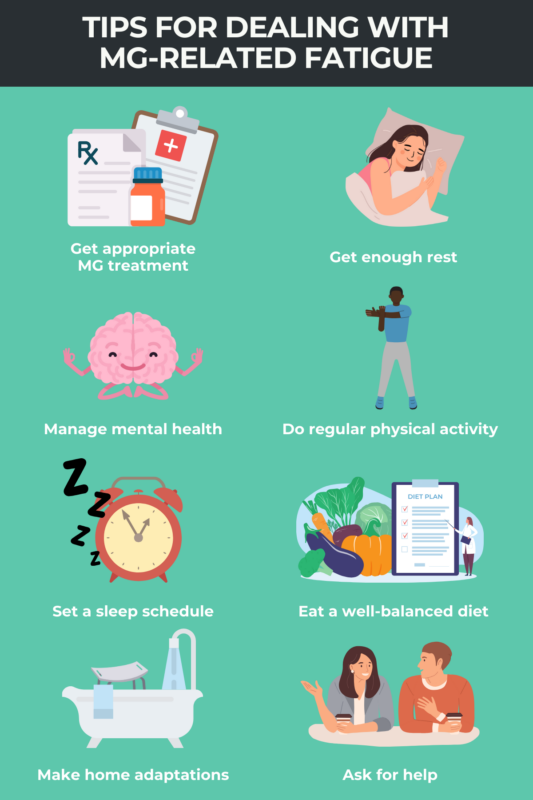
Energy drain: Coping with myasthenia gravis fatigue
Last updated May 1, 2024, by Marisa Wexler, MS

Fatigue is one of the most common symptoms of myasthenia gravis (MG). Fatigue in MG is more than simply feeling tired. It’s a deep-seated lack of energy that is physical as well as mental and makes it harder to meaningfully participate in day-to-day life.
“Fatigue associated with MG is total and complete,” says Mark Harrington, a columnist for Myasthenia Gravis News who has the disease.
“With ordinary fatigue, one knows that going to bed early, sleeping a little late, these will drive away the fatigue,” Harrington says. “When I’m experiencing MG fatigue, I don’t even think about it ending. I just want to sleep.”
While studies suggest that people with MG who have more severe fatigue tend to report worse quality of life, there are strategies for dealing with fatigue. These include getting regular exercise and maintaining a consistent sleep schedule.
Symptoms of fatigue in MG?
MG is an autoimmune disorder caused by antibodies that interfere with signals sent from nerve to muscle cells, leading to muscle weakness. Fatigue is one of the most common symptoms of the disease, and it can be truly debilitating.
Harrington recalls that when he was first diagnosed with MG, “the fatigue was so intense, I could not roll over in bed and turn off the night table lamp.” He remembers laying in bed, wanting to call a friend for support, but having so little energy he couldn’t reach over and pick up his phone.
“One can imagine how this ripples over into almost every other aspect of daily life,” Harrington says. “When I’m unable to turn off a lamp, I’m definitely not able to care for myself.”
Because fatigue cannot be objectively measured, it’s tricky to get a true number for exactly how many people with MG experience clinically meaningful fatigue. Estimates range from slightly fewer than half of patients to more than 80%.
Although fatigue is a well-established common symptom in MG, it’s not known exactly why MG causes fatigue. In fact, the causes of fatigue in general aren’t completely understood. Plus, people with MG can experience different types of fatigue that may have different underlying causes.
For example, people with MG may experience peripheral fatigue, which is fatigue directly related to muscle weakness and results in feelings of low energy. But they also may experience central fatigue, which is a more bodywide feeling of tiredness not related to muscle weakness or pain.
Regardless of the specific underlying cause, studies have identified a few factors that are generally associated with worse MG-related fatigue:
- Disease severity, like fatigue, tends to be more common and more severe among people who report more severe MG.
- Studies have generally indicated women with MG are more likely to report fatigue than men with the disorder. The reasons for these differences aren’t clear; it’s likely that biological as well as social and psychological factors may be at play.
- Mental health can be a factor, as there is a strong association between fatigue and depression in MG. Those who report more severe depression tend to also report more severe fatigue, and vice versa.
Tips for dealing with fatigue
Every person’s experience living with MG and MG-related fatigue is unique, but there are some strategies that may help manage it.
Get appropriate MG treatment
There is a strong association between more severe MG and worse MG-related fatigue. Studies have shown treatments that better control MG also can help with disease-related fatigue.


Living with MG
Navigating Mental Health with Myasthenia Gravis
Harrington says that, in his own experience, the impact of MG-specific treatment on fatigue has been “remarkable.” People with MG who are considering starting a new treatment or changing treatments should consult with healthcare team.
Get enough rest, and do so proactively
Getting plenty of rest is important for fending off fatigue. Harrington says that in his own experience, perhaps the most helpful piece of advice he’s received is to “rest before you feel the need for rest.”
“When I’m working or doing something around the house,” Harrington says, “I always take a break before I feel tired.”
Similarly, he says that if he is planning to attend something that requires a lot of energy, it is crucial to be proactive about getting plenty of rest ahead of time.
“If I know I’m going to a big event such as a wedding, or birthday party, I sleep extra in the few days before the event. I plan my schedule so that the day of the event I won’t have any major ‘to do’s.’ I can chill out,” he says. “This helps me arrive at the event feeling rested and able to enjoy it.”
Manage mental health
Fatigue is closely linked to stress and mental health problems, especially depression. Actively engaging in self-care to manage depression also can help reduce fatigue. This may include medications such as antidepressants, talk therapy, and/or lifestyle changes such as exercising more.
Regular physical activity
Though it may seem counterintuitive, getting regular physical exercise is well established as one of the most effective ways to combat fatigue. Of course, this is often easier said than done for people with MG, as the disease itself can make some types of exercise difficult or more challenging.
People with MG are generally advised to find a form of exercise that’s enjoyable and not so strenuous as to cause muscle weakness. It can be helpful to consult with an expert like a physical therapist who can create a suitable exercise program.
Set a sleep schedule
It may sound obvious, but not getting enough sleep can be a major contributing factor to fatigue. Getting enough good sleep is not only based on the amount of time spent in bed, but also includes the sleep quality and sleep schedule.
One of the most common tips is to try to maintain a very consistent sleep schedule by going to bed and waking up at the same time every day.
Eat a well-balanced diet
What you eat has a profound effect on your energy levels and fatigue. Unfortunately, there isn’t robust data that shows which particular food or supplement is especially good for battling MG-related fatigue.
For that reason, the dietary advice for people with MG is generally similar to what people without MG are told: Eat a well-balanced diet that provides the body with all the nutrients it needs to function properly.
To learn more about what to eat to manage MG, consider consulting a nutritionist.
Make adaptations
MG-related fatigue can make day-to-day activities difficult or impossible to do. Finding less tiring ways to do these activities can preserve strength and help maintain the ability to function.
One quick and easy tip: Many MG patients find it helpful to sit down during activities that they once did standing, such as brushing their teeth or showering.
If doing day-to-day activities seems like a struggle, you may wish to consult an expert in making adaptations such as an occupational therapist.
Ask for help
Even under the best of circumstances, MG-related fatigue makes life harder — but you shouldn’t have to navigate it alone. It’s important to ask for help from healthcare providers, who can offer medical advice and suggest treatment options, as well as friends and family, who can provide emotional support and help with day-to-day tasks.
Myasthenia Gravis News is strictly a news and information website about the disease. It does not provide medical advice, diagnosis, or treatment. This content is not intended to be a substitute for professional medical advice, diagnosis, or treatment. Always seek the advice of your physician or other qualified health provider with any questions you may have regarding a medical condition. Never disregard professional medical advice or delay in seeking it because of something you have read on this website.
Recent Posts
- Blood marker for insulin resistance tied to higher risk of severe MG
- Telitacicept eases symptoms in treatment-resistant gMG: Study
- Aesthetics aside, breast reduction surgery has made my breathing easier
- My twin’s diet changes again after a lactose intolerance diagnosis
- The dangers of misinformation in a world that craves certainty







